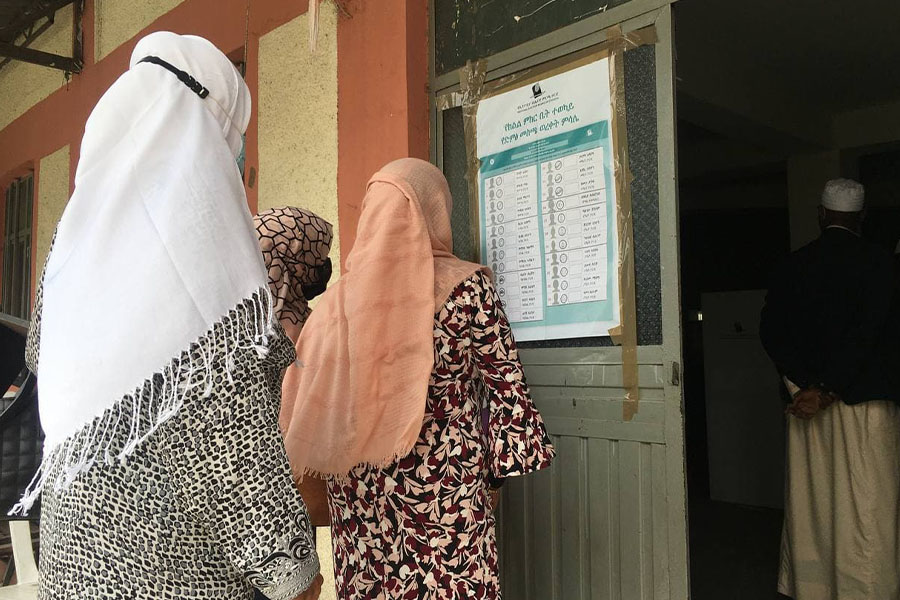
Editorial | Mar 19,2022
Jul 18 , 2021.
The function held by the National Electoral Board of Ethiopia (NEBE) to announce the results last week of the recently held national elections has a streak of chic to it. The crowd ranged from diplomats to government officials and from candidates to poll workers. Officials of the Board have earned rare repute inviting only a few reporters from the domestic media who made it inside. Speeches were made in a brightly decorated hall at the Skyline Hotel while violinists played instrumental between breaks.
The message was clear. Birtukan Mideksa, chairperson of the Board, and her colleagues wanted to show the six national elections were different from the previous elections. In more ways than one, it was very different.
The crowd had to endure hours of the ceremony and a long break before President Sahle-Work Zewde arrived, not to mention nearly three weeks since the polls took place, to hear the results. When they finally were read out, region by region, hardly were there surprises. Earlier results in key constituencies have confirmed what many had anticipated - Prime Minister Abiy Ahmed’s (PhD) Prosperity Party (PP) has won. Stunningly. Perhaps less expected was the extent to which the opposition bloc suffered defeat, taking only 11 of the 436 seats in the federal assembly where the polls took place.
Part of the reason for the Prosperitarians’ landslide victory was the structural advantages they hold. Fielding 2,432 candidates, almost double that of the party with the second most candidates, the Ethiopian Citizens for Social Justice (Ezema), ran uncontested in some areas, including the Oromia Regional State. Opposition parties simply do not have the deep pocket and large network that Prosperity inherited from its predecessor, the EPRDF.
Neither could the opposition rely on pro-incumbent public media to relay their messages daily.
It was also to the advantage of the incumbent that major opposition parties in Oromia, such as the Oromo Federalist Congress (OFC) and the Oromo Liberation Front (OLF), boycotted the elections, attributing their decision to the arrests of their leaders, incarceration of their rank and file and closures of offices which frustrated their leaders. There are constituencies where Prosperity was also unlikely to win had elections occurred, especially in the war-torn Tigray Regional State.
The election was relatively peaceful but far from inclusive.
The ruling party also had the natural edge provided by the bully pulpit. A party member who is an official gets more media exposure due to the office they occupy and the official duty they performed. For instance, Seleshi Bekele (PhD), minister of Water, Irrigation & Energy, ran for a seat representing Addis Abeba in the federal parliament. He has about 93,000 followers on Twitter, which is higher than any opposition or independent candidate contested in the elections.
The opposition bloc has also not done itself any favour for failing to strike an electoral coalition, as was the case during the 2005 election with the Coalition for Unity & Democracy, aka Qinjit.
Take the three major parties that vied for Addis Abeba, Ezema, Balderas for True Democracy and Enat Party. Their leaders declared the parties` social bases to be in the capital. They generally have a similar ideology, except perhaps for class differences between the first two. Ezema seems in tune with the middle-class, while Balderas has support within the economically disenfranchised residents of the capital. In choosing to run separately, though, they split votes between them, giving the ruling party the upper hand.
But that was part of the story. Prosperitians have gained electoral victory in huge margins, its candidates have surpassed in hundreds of constituencies the combined votes of their contenders. It was no different with voters in Addis Abeba.
There is one more reason why the ruling party was given a five-year mandate, which was evident during the elections. While polling day on June 21 concluded without a major security setback in the places where the elections took place, what had enveloped the electorate was a deep sense of insecurity.
The country has gone through one of its most raucous times. There was the COVID-19 pandemic, bringing with it one of the slowest growth rates over the past almost two decades, not to mention the death of over 4,300 people across the country. Desert locust invasion wiped out harvests and flooding displaced families in places such as the Afar Regional State.
The political situation was worse. Communal violence has seen cities burn, millions displaced, and thousands killed. Political violence targeted at minorities has resulted in massacres too gruesome to describe. On the rise for a while, the privatisation and regularisation of violence took on a life of its own over the past year. There is the war in the Tigray Regional State, bringing to the country all the horror and despair Ethiopians have heard about from sectarian conflicts in the Middle East, Eastern Europe and Africa as two parties decided they no longer tolerate each other.
The public feels that it is back in the era of the later 20th Century - the lost years of economic development and extreme political dysfunction – no longer able to secure a better future for the next generation.
The choice to give Prosperity half a decade as a ruling party was perhaps not a vote for its economic policies or even ideological leanings. Voters have chosen authority - and what better to represent this than a party in office - over the lawlessness that has been an emblem of the political space over the past five years. There is indeed a difference of opinions over a range of issues, but neither is there a disagreement that the priority is order and stability.
Once the next session of parliament begins, the Prosperitarians will form a government led most likely by Prime Minister Abiy. There is only one honeymoon period, in politics as in marriage. Thus it will be straight to work and the nitty-gritty of governing a political community in turmoil. If voters’ intention were indeed continuity instead of another transfer of power to untested parties in the opposition bloc, the consequences of which are unknowable, they would likely get it. It is unlikely there would be significant surprises from the incumbent, as there were over the past three years, such as rapprochement with Eritrea or the opening up in the economic front.
If anything, the battle lines have already been drawn, and friends and foes have been identified. Even the international community has found itself divided fairly deeply on the issues of Ethiopia, from the Tigray crisis to the Grand Ethiopian Renaissance Dam (GERD).
But the incumbent should be able to rise above the divisions that define political life in Ethiopia. Voters have shown they are more united than often assumed by keeping their contract with the incumbent and hoping to ascertain order and stability. Prosperitians have responsibilities on their hands - the well-being of over 100 million people. Their overriding priority should be to secure peace, for no citizen deserves to live daily in fear and anxiety. This requires finding the courage to enter into dialogue seeking political settlement and forge alliances.
Voters have waived their evident differences to vote for authority, stability and order. The incumbent and its leaders should heed these calls and prioritise an all-inclusive dialogue for a negotiated settlement between the warring parties. Such is the road that remains untravelled.
PUBLISHED ON
Jul 18,2021 [ VOL
22 , NO
1107]

Editorial | Mar 19,2022

Viewpoints | May 18,2019

Editorial | Aug 16,2020

Advertorials | Dec 19,2023

Commentaries | Jan 13,2024

Fortune News | May 08,2021

Viewpoints | Nov 12,2022

Fortune News | Sep 30,2021

Radar | Aug 16,2020

Sunday with Eden | May 25,2024

Photo Gallery | 175853 Views | May 06,2019

Photo Gallery | 166070 Views | Apr 26,2019

Photo Gallery | 156475 Views | Oct 06,2021

My Opinion | 136846 Views | Aug 14,2021

Dec 22 , 2024 . By TIZITA SHEWAFERAW
Charged with transforming colossal state-owned enterprises into modern and competitiv...

Aug 18 , 2024 . By AKSAH ITALO
Although predictable Yonas Zerihun's job in the ride-hailing service is not immune to...

Jul 28 , 2024 . By TIZITA SHEWAFERAW
Unhabitual, perhaps too many, Samuel Gebreyohannes, 38, used to occasionally enjoy a couple of beers at breakfast. However, he recently swit...

Jul 13 , 2024 . By AKSAH ITALO
Investors who rely on tractors, trucks, and field vehicles for commuting, transporting commodities, and f...

Oct 18 , 2025 . By NAHOM AYELE
In a sweeping reform that upends nearly a decade of uniform health insurance contribu...

A bill that could transform the nutritional state sits in a limbo, even as the countr...

Oct 18 , 2025 . By SURAFEL MULUGETA
A long-planned directive to curb carbon emissions from fossil-fuel-powered vehicles h...

Oct 18 , 2025 . By BEZAWIT HULUAGER
Transaction advisors working with companies that hold over a quarter of a billion Bir...